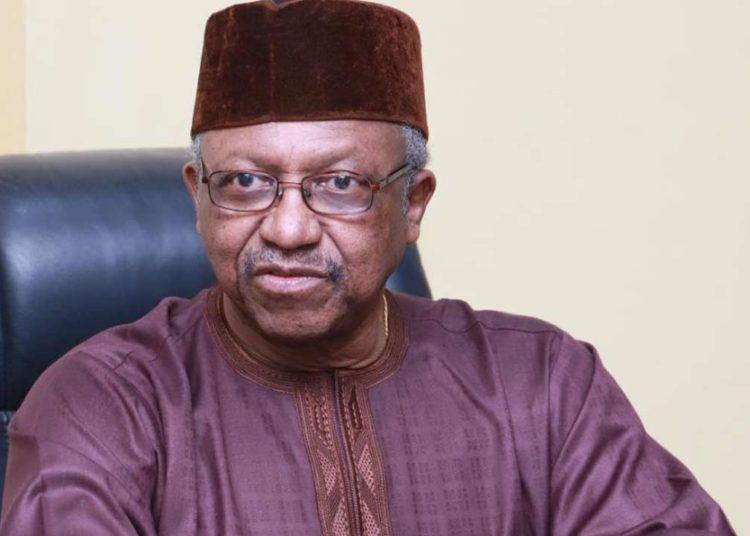The long-running depletion of Nigeria’s health workforce has taken a turn for the worse with the doctor-to-patient ratio in the country now 1:10,000 as against the World Health Organisation (WHO) recommendation of 1:1,000, according to the National Institute for Policy and Strategic Studies (NIPSS).
At the moment, Nigeria has the third-largest number of foreign medical doctors working in the United Kingdom after India and Pakistan.
The director-general of NIPSS, Professor Ayo Omotayo, disclosed this yesterday at a one-day symposium with the theme: Nigeria’s Recent Health Sector Brain Drain and Its Implications for Sustainable Child and Family Health Service Delivery.
The event was organised by the development Research and Projects Centre (dRPC) in collaboration with NIPSS, in Abuja, yesterday.
Ayo said, “Nigeria lost over 9,000 medical doctors to the United Kingdom, Canada, and the United States of America between 2016 and 2018, adding that a total of 727 medical doctors trained in Nigeria relocated to the United Kingdom alone in six months, between December 2021 and May 2022.
“The data from the Register of the Nursing and Midwifery Council (NMC) of the UK shows that the number of Nigeria-trained nurses increased by 68.4 percent from 2,790 in March 2017 to 7,256 in March 2022.”
The NIPSS DG lamented that this trend of skill migration from the health sector is happening when the country’s population is expanding geometrically.
“It is estimated that by 2030, there will be 272.5 million Nigerians. This implies that there will be no medical doctors to meet the medical needs of the population,” he said.
This, the DG said, calls for an improved health workers’ supply to tackle the supply deficit in order to solve the disease burden and positively turn the tide of health indicators.
He also stressed the need for the country to meet the 15 per cent allocation of the total domestic budget to the health sector as pledged by the country and other African countries in 2001.
The president, Nigerian Medical Association (NMA), Dr. Ojinma Uche, called for the establishment of a Health Development Bank to facilitate development of the health care sector.
He said if agriculture and industries have Agric Bank and Bank of Industries ( BOI), then it is wrong to neglect the sector that provides the basis for the workforce to be strong and productive.
On poor funding of the health sector, Orjinma said since the mandate from the WHO and the Abuja Declaration, Nigeria’s budget allocation for health has remained consistently low between 2.0 and 6.0 per cent (5.75% for 2023 proposed budget).
“In the original 2020 budget of N10.59trillion, Health got N464billion which was approximately 5% (with approximately N52bn as capital expenditure while N412bn was for recurrent expenditure) while Security received N1.5trn which was approximately 14.2% (Defence N975bn, Police Affairs N410bn, Office of National Security Adviser N169bn and Police Service Commission N1.4bn).
“Out of the N464 billion allocated to the Health sector, only N59 billion was for capital expenditure. The news got worse after COVID-19 lockdown as the budget was revised downward and the Health budget was cut in half.
“Kindly tell me how all federal tertiary health institutions will rely on N26 billion to provide structures and cutting-edge equipment for training and services?
“This is why the work environment is depressing, while we can do nothing for many patients despite knowing what to do because of lack of equipment.
“In the 2023 proposed budget, Health is to get N1.17 trillion (5.75%) while Security and Defence will get N2.56trillion (12.5%),” he said.
US Assists 1.9m Nigerians Living With HIV
Meanwhile, the United States Centre for Disease Control and Prevention (USCDC) has increased its assistance to over 1.9 million Nigerians living with HIV with access to free treatments.
USCDC country director in Nigeria, Dr Mary Boyd, disclosed this at the opening of a two-day CDC Biannual Programme Performance Review Meeting and Symposium in Abuja yesterday with the theme: “Working Together to Bring Nigeria Closer to HIV Epidemic Control”.
In his speech, Boyd said, “Today 1.9 million people living with HIV have access to free treatments, and its treatment is going to save their lives and allow them to live healthy, productive lives.
“The other thing that I was reflecting on is Americans historically love the underdog, and we root for the underdog, we support the underdog in whatever way we can, and we as the US government have been so proud to be part of the success that Nigeria has had.
“And along the way, we’ve had champions, and those champions are sitting here and also in the audience. So, I want to just appreciate you all. I want to welcome the CEOs of our implementing partners; I call them the superheroes.”
The minister of health, Dr Osagie Ehanire, in his keynote address, lauded the USCDC for its ceaseless efforts and achievements in tackling HIV in Nigeria.
Represented by the national coordinator for AID & STI Prevention, Dr. Akudo Ikpeazu, the minister said Nigeria had enjoyed the goodwill and generosity of the United States government through the US President’s Emergency Plan for AIDS Relief (PEPFAR).
He added that the US had recorded remarkable progress with a reduction of the burden of HIV and contributing remarkably to the 1.9 million Nigerians who are receiving life-saving antiretroviral treatment.
“And, of course, these are the key elements of our response, to name a few, since 2018 which has made us move from a data poor to a data rich country as far as HIV is concerned.”
Brain Drain Hits Health Sector
According to the minister, Nigeria has recommitted itself to work with its partners to drive actions towards achievement of the 2025 global HIV targets and to keep Nigeria on track to ending AIDS by 2030.
He went on: “I take this opportunity to also recognise the partnerships with CDC through which led us to pandemic preparedness and emergency response system and structures have been strengthened in building on the rapid and general support to emergency response to COVID-19.
“I encourage the use of HIV response platforms and investments for continued strengthening of health systems and pandemic preparedness. As you know, in 2020, the government and its major treatment partners, PEPFAR and the US government and the Global Fund, embarked on a joint alignment to resources in support of the National HIV programme.’’
Ehanire further stated that Nigerians had seen the gains of this new implementation architecture and were looking towards the second phase which had been christened Alignment 2.0 as a means to strengthen coordination, leadership and governance of the response, especially at sub national level.
In his goodwill message, the representative of the director general of National Agency for the Control of AIDS (NACA), Dr Alex Ogundipe, maintained that Nigeria had come to a stable phase of the epidemic.
“All that we’re asking as Nigeria, the Nigerian government, in terms of the way we think about resources, is that it is time to normalise this. It is time to go back to the strategy of efficient ways to do things and fill in the capacity gaps or system deficiencies.
“Let’s build it so that we can return what needs to be returned to the society and let it grow efficiently and effectively. This, for us, is how we define what we mean by sustainability,” he said.
COVID-19: 56m Nigerians Vaccinated, Says NPHCDA
The federal government yesterday received 22 portable ultra-low temperature freezers donated by the United Parcel Service (UPS) Foundation to boost the country’s energy-efficient cold chain systems for vaccine storage.
The executive director of the National Primary Healthcare Development Agency (NPHCDA), Dr. Faisal Shuaib, who spoke while receiving the donation in Abuja, disclosed that as of 13th October 2022, a total of 56,594,138 (representing 50.6%) of the 111,776,503 eligible population in the country had been vaccinated against COVID-19.
According to him, making this remarkable progress amidst persistent disinformation and low risk perception has been possible because of the significant support the country has received from its development partners, including UPS.
Shuaib said, “We cherish our partnership with UPS and will continue to work with all stakeholders to ensure that Nigeria meets its target of vaccinating half of its overall population against COVID-19.
“Our country moves rapidly towards herd immunity. It is my firm belief that no country in the world is safe from COVID-19, and no business entity is safe from its adversities until all of us are safe.”
Shuaib reiterated that the SCALES 3.0 campaign strategy recently launched by the Agency offers a unique opportunity for childhood vaccination and other Primary Health Care (PHC) services for beneficiaries concurrently with COVID-19 vaccination.
He, therefore, urged parents to take their eligible children for vaccination against polio, yellow fever, measles and other vaccine-preventable childhood diseases in the same locations where the adults also receive COVID-19 vaccines.





